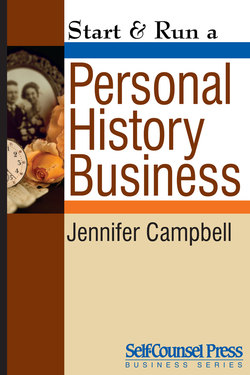Читать книгу Start & Run a Personal History Business - Jennifer Campbell - Страница 15
На сайте Литреса книга снята с продажи.
3.1 How a personal historian can work with a genealogist
ОглавлениеGenealogists, both professional and hobbyists, are uncovering vast amounts of historical data, largely thanks to the Internet and more sophisticated searching techniques. But all too often, once they’ve uncovered the names, dates, charts, and documents, that’s where it ends. The piles of paper are not all that accessible for sharing. They’re not even that interesting, especially to the younger generation. Enter the captivating power of story. A personal historian can write a narrative that brings life to that material, illustrating it with images of maps, newspaper clippings, etc., that tells the story behind those dear departed relatives and the places and times they lived.
By the same token, personal historians can enhance their projects using the tools in a genealogist’s toolbox. Besides adding important background information, research can trigger more memories, verify guesses about where ancestors settled, flesh out details about an ocean voyage, and uncover other details that add depth and context to a person’s memoir. These can include:
• maps — both historic and current — about places the narrator mentions, or that illustrate a person’s or family’s migration over the years
• wills, birth and death certificates, military papers, census pages, passenger records
• family trees that clarify relationships
Linda Coffin, a Minneapolis, Minnesota, personal historian with extensive training and experience in genealogy, shares this example of how she used genealogy tools to enhance a personal history project:
“An elderly client wanted to know more about her mother’s Polish Catholic family. Since her Polish grandfather cut off her mother for marrying an English Protestant, she doesn’t have any leads. We started with the census, which shows the structure of her mother’s family, listing the grandfather and grandmother as a young couple with three children. A World War I draft registration database gives her a physical description of her grandfather, his address in 1917, and the name of a brother who was listed as a family contact. City directories provide address listings for both the grandfather and his brother. Since the draft card also lists the grandfather’s employer, business records can provide more information on his occupation. A search of the Catholic parish records for that part of the city opens a gold mine of information on baptisms, marriages, and burials. Land records show that the grandfather eventually moved to another state and died there. Ultimately, the client has a reunion with her second cousins — the grandchildren of the brother named on the draft registration card.”
Personal historians can do some genealogical research themselves, starting with websites such as Ancestry.com/.ca, NARA.com (National Archives), and Rootsweb.com, as well as regional and local historical societies. However, hiring a professional genealogist, which can be found through the Association of Professional Genealogists at www.apgen.org, might save time and guarantee a more productive search. They are trained and experienced in using many types of repositories (archives or places of storage and preservation), and they know how to look for specific information in the right places. Many have special areas of expertise: documents such as court records, vital records or passenger records. Others specialize by locality, such as German research, or research in Pennsylvania. Others are experts in certain repositories such as the Family History Library in Salt Lake City, or the National Archives in Washington, D.C.
If genealogy is your passion and you want to learn more, the National Genealogical Society (www.ngsgenealogy.org) offers a 16-month intensive correspondence course.
The Family History Library in Salt Lake City, the Allen County Public Library in Fort Wayne (Indiana), the Newberry Library in Chicago, Stamford University in Birmingham (Alabama), and the National Archives in Washington DC have frequent workshops and ongoing classes. The University of Toronto offers several online Certificates in Genealogical Studies with specialization in various countries.
